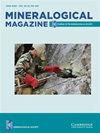结晶岩中地下水-岩石的相互作用:来自SIMS氧同位素数据的证据
IF 1.4
3区 地球科学
Q2 MINERALOGY
引用次数: 0
摘要
摘要裂缝中流动的流体和围岩之间溶解物质的扩散交换(岩石基质扩散)被认为是一种机制,通过这种机制,来自放射性废物库的放射性核素可以从地下水中去除并融入地圈。为了测试火成岩和变质岩中扩散交换的有效性,我们对低温(<100°C)下形成的矿脉进行了研究,比较了围岩中矿脉方解石和次生方解石的氧同位素组成。坎布里亚郡Borrowdale火山群的两个矿脉和英国莱斯特郡Mountsorrel Granodiorite的一个矿脉具有非常相似的矿脉方解石成分,约+20‰(SMOW)或更大,比宿主岩石的可能成分重得多,推断这些脉状方解石成分反映了渗透流体和脉状形成的温度。围岩中的方解石与矿脉中的方解石相似,几乎没有与围岩交换的证据。这些结果支持了这类矿脉的现有模型,该模型表明,最初与二叠纪或三叠纪蒸发岩有关的地层卤水低温生长。结果与穿过裂缝的水流通过裂缝附近的损伤区衰减一致,并且没有提供与围岩孔隙水扩散交换的证据。本文章由计算机程序翻译,如有差异,请以英文原文为准。
Groundwater–rock interactions in crystalline rocks: evidence from SIMS oxygen isotope data
Abstract The diffusive exchange of dissolved material between fluid flowing in a fracture and the enclosing wallrocks (rock matrix diffusion) has been proposed as a mechanism by which radionuclides derived from a radioactive waste repository may be removed from groundwater and incorporated into the geosphere. To test the effectiveness of diffusive exchange in igneous and metamorphic rocks, we have carried out an investigation of veins formed at low temperatures (<100°C), comparing the oxygen isotopic composition of vein calcite with that of secondary calcite in the wallrocks. Two examples of veins from the Borrowdale Volcanic Group, Cumbria, and one from the Mountsorrel Granodiorite, Leicestershire, UK, have remarkably similar vein calcite compositions, ca. +20‰(SMOW) or greater, substantially heavier than the probable compositions of the host rocks, and these vein calcite compositions are inferred to reflect the infiltrating fluid and the temperature of vein formation. Calcites from the wallrocks are similar to those in veins, with little evidence for exchange with the wallrocks. The results support existing models for this type of vein which suggest low-temperature growth from formation brines originally linked to Permian or Triassic evaporites. The results are consistent with flow through fractures being attenuated through a damage zone adjacent to the fracture and provide no evidence of diffusional exchange with pore waters from wallrocks.
求助全文
通过发布文献求助,成功后即可免费获取论文全文。
去求助
来源期刊

Mineralogical Magazine
地学-矿物学
CiteScore
4.00
自引率
25.90%
发文量
104
审稿时长
6-12 weeks
期刊介绍:
Mineralogical Magazine is an international journal of mineral sciences which covers the fields of mineralogy, crystallography, geochemistry, petrology, environmental geology and economic geology. The journal has been published continuously since the founding of the Mineralogical Society of Great Britain and Ireland in 1876 and is a leading journal in its field.
 求助内容:
求助内容: 应助结果提醒方式:
应助结果提醒方式:


